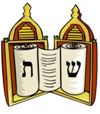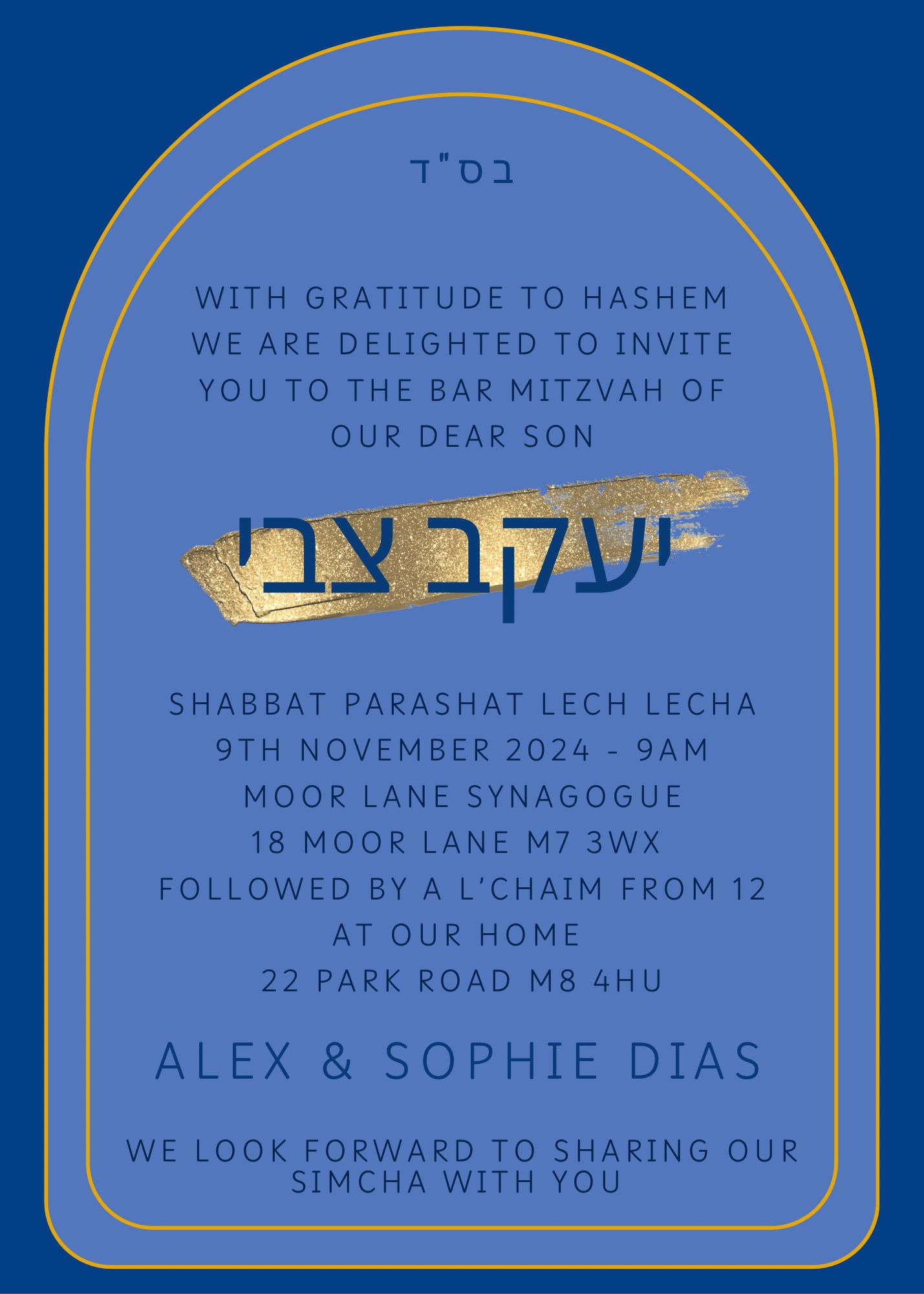
ק׳ ק׳ שׁערי תפילה

*****
Bar Mitzvah Invitation



****************

Winter Season begins
THIS WEEK

****

****
🗓️
לוח זמני תפלה לחורף תשפ״ה
Winter Timetable 5785 – 2024/25
מוצאי שבת | ערבית | שקיעה | מנחה שבת | סוף זמן קריאת שמע | הדלקת נרות | מנחה וקבלת שבת | תאריך | שבת פרשת |
Shabbat Ends | Arbit | Sunset | Minha | Shema before | Candle Lighting | Minha & Kabbalat Shabbat | Date | Parasha |
PM | PM | PM | PM | AM | PM | PM |
|
|
5:14 | 5:10 | 4:19 | 3:45 | 9:38 | 4:07 | 4:07 | 8/9 Nov | לך לך |
🕯️WINTER TIMES FOR SHABBAT MORNING🕯️
שבת
קרבנות
8:45 am
הודו
9:00 am
*******

Ten generations have passed since Noach. Man has descended spiritually. In the year 1948 from Creation, Avram is born. By observing the world, Avram comes to recognize G-d’s existence, and thus merits G-d appearing to him. At the beginning of this week’s Torah portion, G‑d tells Avram to leave his land, his relatives and his father's house and travel to an unknown land where G-d will make him into a great nation. Avram leaves, taking with him his wife Sarai, his nephew Lot, their servants, and those whom they converted to faith in G-d. When they reach the land of Canaan G-d appears to Avram and tells him that this is the land that He will give to his descendants.
A famine ensues and Avram is forced to relocate to Egypt to find food. Realizing that his wife’s beauty could cause his death at the hand of the Egyptians, Avram asks her to say that she is his sister. Sarai is taken to Pharaoh, but G‑d afflicts Pharaoh and his court with severe plagues and she is released unmolested. Avram returns to Eretz Yisrael (Canaan) with much wealth given to him by the Egyptians. During a quarrel over grazing rights between their shepherds, Avram decides to part ways with his nephew Lot. Lot chooses to live in the rich but corrupt city of Sodom in the fertile plain of the Jordan. A war breaks out between the kings of the region and Sodom is defeated. Lot is taken captive. Together with a handful of his converts, Avram rescues Lot, miraculously overpowering vastly superior forces, but Avram demurs at accepting any of the spoils of the battle.
In a prophetic covenant, G-d reveals to Avram that his offspring will be exiled to a strange land where they will be oppressed for 400 years, after which they willemerge with great wealth and return to Eretz Yisrael, their irrevocable inheritance. Sarai is barren and gives Hagar, her Egyptian hand-maiden, to Avram in the hope that she will provide them with a child. Hagar becomes arrogant when she discovers that she is pregnant. Sarai deals harshly with her, and Hagar flees. On the instruction of an angel, Hagar returns to Avram and gives birth to Yishmael. The weekly portion concludes with G-d commanding Avram to circumcise himself and his offspring throughout the generations as a Divine covenant. G-d changes Avram’s name to Avraham, and Sarai’s name to Sarah. Hashem promises Avraham a son, Yitzchak, despite Avraham being ninety-nine years old and Sarah ninety. On that day, Avraham circumcises himself, Yishmael and his entire household.
Ohr Somayach Institutions www.ohr.edu

דין הזכרת משיב הרוח
מתחילין לומר “משיב הרוח ומוריד הגשם” החל מתפילת מוסף של חג שמחת תורה, והזכרה זו, אינה שאלה ובקשה על הגשם, אלא היא שבח להשם יתברך, ולכן הזכרה זו נקראת “גבורות גשמים”, שמדברת מענין גבורותיו של השם יתברך בעולמו.
אבל שאלת “טל ומטר” שבברכת השנים, (כלומר, בברכת ברך עלינו, או ברכנו, שאומרים “ותן טל ומטר לברכה”), היא בקשה מהשם יתברך על הגשם. וישנם כמה הבדלים בהלכה, בין הזכרת גבורות גשמים שבברכת “אתה גבור”, לבין שאלת טל ומטר שבברכת השנים, והשינוי הראשון הוא, שמזכירין גבורות גשמים, כבר מתפילת מוסף של שמחת תורה, ואילו שאלת גשמים, אינה אלא מליל שבעה במרחשון.
אבל אם לא הזכיר כלל, לא “מוריד הטל”, ולא “משיב הרוח”, (כפי מנהג חלק מעדות האשכנזים בימות הקיץ), ונזכר בטעותו מיד לאחר שסיים את ברכת “מחיה המתים”, עליו לומר מיד “משיב הרוח ומוריד הגשם”, ואחר כך ימשיך בברכת “אתה קדוש”. ואם התחילה כבר בברכת “אתה קדוש”, ונזכר שלא אמר “משיב הרוח”, הרי אין לו תקנה, ועליו לחזור שוב לראש התפלה.
The Laws of Mentioning “Mashiv Ha’Ruach”
We Begin Reciting “Mashiv Ha’Ruach”
“Mashiv Ha’Ruach U’Morid Ha’Geshem” is a praise we recite to Hashem during the winter months within the “Mechayeh Ha’Metim” blessing of the Amidah as is printed in all Siddurim.
We begin reciting “Mashiv Ha’Ruach U’Morid Ha’Geshem” in the Mussaf prayer of Simchat Torah (outside of Israel from Shemini Atzeret). This recitation does not constitute a request or plea for rain; rather, it is merely meant as praise to Hashem and is therefore dubbed, “Powers of Rain.” The actual request for dew and rain can be found in the ninth blessing of the Amidah prayer referred to as the “Blessing of the Years” (Barech Aleinu). There are several halachic differences between mentioning the “Powers of Rain” in the second blessing of the Amidah prayer entitled, “Ata Gibor,” and the actual request for dew and rain in the ninth blessing. Firstly, whereas we begin mentioning the “Powers of Rain” from Mussaf of Shemini Atzeret, we do not actually request dew and rain until the night of the Seventh of Marcheshvan (outside of Israel from the night of the Fifth of December), as we shall discuss in following Halachot.
Why is “Mashiv Ha’Ruach” Mentioned in the “Mechayeh Ha’Metim” Blessing?
The Gemara (Berachot 33a) states that we mention the “Powers of Rain” in the “Ata Gibor” blessing for this blessing deals with the Resurrection of the Dead and since rainfall is tantamount to The Resurrection, our Sages thus established this sentence to be mentioned in the blessing dealing with The Resurrection. Our Sages established the actual request for rain in the “Blessing of the Years,” for this is a blessing regarding one’s livelihood and rainfall is a matter of sustenance for the entire world.
One Who Forgets to Mention “Mashiv Ha’Ruach”
If one forgets to recite “Mashiv Ha’Ruach” and becomes aware of his mistake only after concluding the “Mechayeh Ha’Metim” blessing, we must analyze whether one must return to the beginning of the Amidah prayer and begin it again or may one continue his prayer as usual. This law indeed depends on one important factor: If one inserted “Morid Ha’Tal” instead of “Mashiv Ha’Ruach” (as is the Sephardic custom during the summer months), one would not return to the beginning of the Amidah prayer since one has said “Morid Ha’Tal.”
However, if one mentioned neither “Mashiv Ha’Ruach” nor “Morid Ha’Tal” (which is indeed customary among several Ashkenazi communities during the summer months), if one has not yet begun the “Ata Kadosh” blessing, one should recite “Mashiv Ha’Ruach U’Morid Ha’Geshem” between the “Mechayeh Ha’Metim” and “Ata Kadosh” blessings and then just continue his prayer as usual. If, however, one has already begun the “Ata Kadosh” blessing and only then realizes his mistake, one must begin his Amida prayer anew.